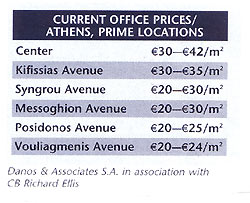
|
The logic of the saying "Invest in real estate, they're not making any more" has never been more apparent in Greece than in the past few years with the meeting of EMU convergence criteria, the awarding of the 2004 Olympic Games, and the influx of billions of euros into the economy, led by the third community support framework funds.
Is Real Estate The Next Best Thing? BY RAYMOND MATERA Posted with special permission granted by The American Hellenic Chamber of Commerce
|
CATALYSTS OF CHANGE In Athens, the Attiko Metro played a major role in shifting transportation hubs and assigning new values to areas and neighborhoods. Locations with ready access to the Metro suddenly became far more attractive to commuters. The new airport at Spata, together with the Athens Ring Road connecting western and eastern Attica, are creating an entire shift in office, hotel and commercial demand, creating a new northern development axis in one fell swoop. And, the 2004 Olympic Games are causing unprecedented diversions by transforming entire areas, local infrastructures and transportation nodes that will have a long lasting impact on the real estate scene. At the recent MIPIM Real Estate Exhibition in Cannes, France, held March 12-15, the Greek presence "has been concentrating on three areas this year – Maroussi, Patras and Thessaloniki – each of which is experiencing profound change," according to official reports. Exhibition literature says that "the Municipality of Maroussi will be given a huge boost by the Olympic Games as 75% of spectators will pass through turnstiles within its boundaries. Maroussi is also the financial center of Athens and last year was given a BBB credit rating by Standard & Poor."
To the south, transportation is also playing a pivotal role in effecting change and development. With Patras as its gateway, the Peloponnese is being more widely opened up with the construction of the Rio-AntiRio Bridge. And, there is a mixed redevelopment of the port area under way which will be completed by 2004. Patras is also developing a Formula-1 standard motor racing track on a 1.25 million square meter site outside the city. NEW DIRECTIONS Real estate has always had a significant influence on demographics, if not at times the other way around. A major development – shopping center, new residential area, entertainment hub – can initiate an entire displacement in towns and cities, changing the essential character of an area. In Boston, the renovation and development of the waterfront and Faneuil Hall forever changed a whole section of the downtown. The same happened in London at Canary Wharf, at the Baltimore waterfront, and countless other areas. As Greece begins a new chapter in development, certain projects are bound to have striking effects and create substantial opportunities. The public and private sectors are about to enter a new era of business relationships that will exploit some of the country's most attractive land. According to George Zygoyiannis, chairman of the Greek Public Real Estate Corporation (KED), "opportunities for inward investment have also improved since all regulations on foreign ownership were finally removed last year." KED has the largest real estate portfolio in the country, with more than 100,000 properties, and plans to sell assets by the end of 2002 that will net more than $120 million. Total revenues from its public sector services accounts are expected to exceed $800 million during the 2000-2004 period.
The most significant project to be carried out under the auspices of ETA is the hybrid theme park to be built at Anavissos, outside Athens – the development of a Greenfield area covering 1,670,000 square meters, along both sides of the Athens-Sounio national road from the 48th to the 53rd kilometers. The theme park, whose investment is expected to reach up to €300 million, will be based on Greek mythology and will include a variety of facilities – hotels, conference centers, sports and leisure properties, and provisions for marine activities. Mega infrastructure developments, Olympic Games projects, and the economic upturn of the last decade also have a strong influence on prices for the existing stock of properties, including office, retail and industrial properties. The office and retail market started to become ember hot at the beginning of 2000, with expectations by many that the trend would continue up to 2004. But, according to recent studies, the market pulled back sharply during late 2001 and is in a wait-and-see phase at the moment. OFFICE SPACE According to Stelios Pikis, Head of the International Department of Danos & Associates S.A. in association with CB Richard Ellis in Athens, "office space in the capital covers about 8 million square meters, about 30% of which is in the center, 20% along Syngrou Avenue, and 25% along Kifissias Avenue. The Attiki Odos region is receiving the most attention for new office space, and to a lesser extent the previous industrial area of Piracus Avenue, Thivon, Kifisou, and Kavala Avenues." Mr. Pikis says that after two years of rising prices, "investors are now finding asking prices unreasonable," although there is indeed a higher demand for larger offices and new government premises. LEADING INDICATORS The American Hellenic Chamber of Commerce, is a non-profit, self-supporting organization, and was established in 1932 to promote economic and business relations between the United States and Greece. With a corporate membership today of some 1,000 U.S. companies operating in Greece and major Greek enterprises doing business with the U.S., it continues to encourage and facilitate trade, investments and professional partnerships from both sides of the Atlantic. Additionally, the Chamber is a fully accredited member of the U.S. Chamber of Commerce in Washington, D.C., and affiliated with the European Council of American Chambers of Commerce (ECACC). |
|



